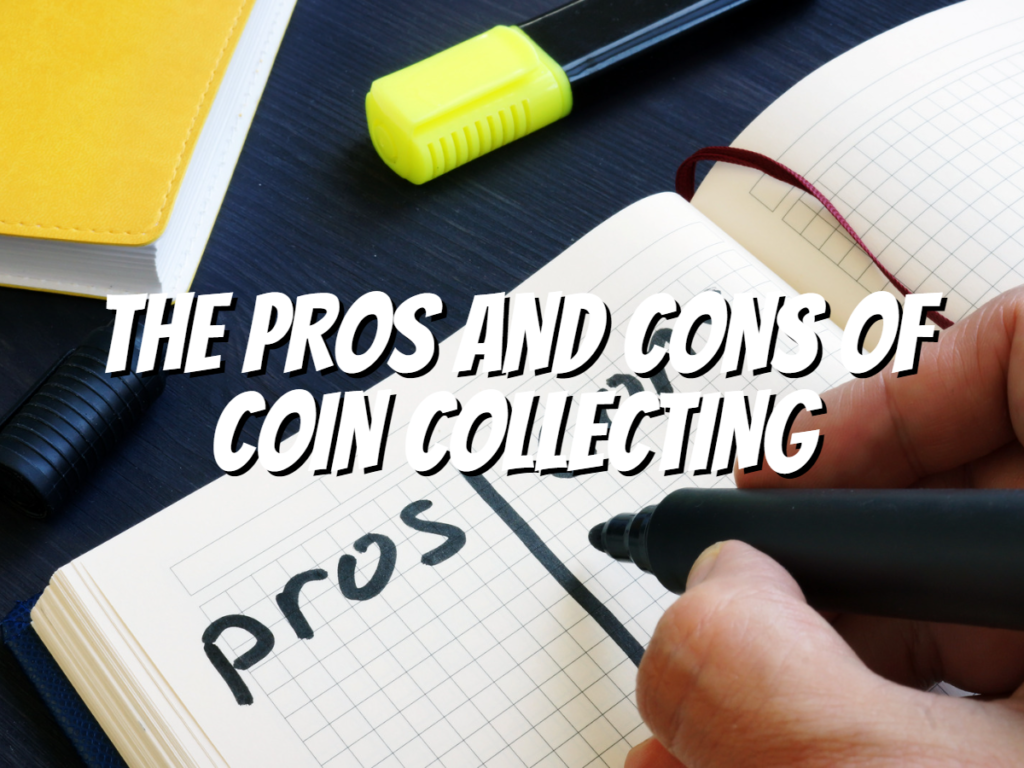Coin collecting is a great hobby. It’s relatively inexpensive, can be rewarding, and there’s plenty of information available if you’re new to the hobby.
However, like any other collection—stamps, baseball cards, or comic books—it also has its pitfalls.
In this post, we’ll cover some of the benefits and drawbacks of coin collecting so that you know what to expect when you’re ready to start your collection!
Pros and Cons of Coin Collecting:
Pros:
US coins are Documented and Accessible.

Unquestionably, US coins are the most straightforward to study. There will undoubtedly be a book (or several books) devoted to any series you choose.
In addition, numerous price guides, a wealth of auction data, and many other enthusiasts in the hobby are available to assist with your inquiries.
US Coins are Widely Available
You shouldn’t have trouble locating items for sale unless you’re searching for something uncommon or of an exceptional grade.
US coinage makes up most dealers’ inventories and major auctions, offering everything from the least expensive raw materials to the most expensive coins.
Storage Options

Several albums and folders are available for most series to serve as a structure for your set if you’re collecting raw coins.
If it’s a popular series, you’ll probably be able to find an album in the style or manufacturer you like.
There’s Something for Everyone
US coins come in a wide variety that can accommodate almost any budget or interest.
Any series from the 20th century is often very accessible, and the more recent they are, the less expensive they tend to be.
The early US currency or a gold series are options if you want to spend a little extra.
Learning about History

Coins may teach you a lot of intriguing things. For instance, by examining the coins of a certain nation or area, you might learn about its history.
Additionally, you can learn about various coin creation and design facets. Additionally, collecting allows you to advance your knowledge of numismatics and economics (the study of money).
All in all, antique coins can be a terrific educational resource for anyone interested in learning more about global history and currency.
You Can Make Money
The monetary value of collecting money may hold the most interest for coin collectors.
Even if a board full of quarters may not seem thrilling or useful, their worth will rise over time.
Cons:
Supply and Demand

Due to a large number of collectors, items with the same level of rarity cost more than items from the ancient world.
This has become more obvious for top pop pieces, which sell for much greater costs than the following grade down, as registry sets have become increasingly popular.
In addition, there will probably be several competitors for each piece, raising pricing.
Competitive
Registry sets are common. You need a large budget to obtain a #1 ranked registry set in any US series.
They are a very popular tool for collecting and can offer a fun challenge when achieving a high-ranking set, but this is only an issue if you’re collecting graded pieces and care about registry sets.
Cherrypicking Opportunities
Cherrypicking valuable kinds of US coins can occasionally be difficult because research is so easily accessible.
You might be one of many individuals who notices if something is unattributed for sale because many people are searching for the same types as you.
Before you go…
We’ve given you a better idea of coin collecting, why people do it, and how to get started. It’s an exciting hobby that can take your life in surprising directions, but like any other activity, it has ups and downs. I hope this article helped you answer your questions! Happy Collecting!
Check out my next article: “Questions about Coin Collecting.”
Related Articles:

